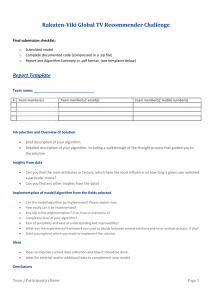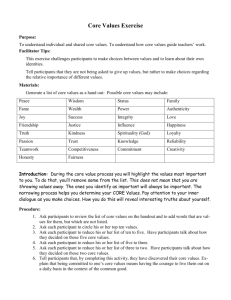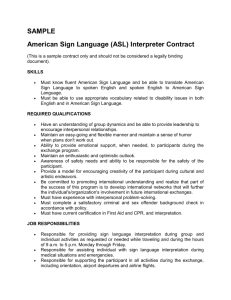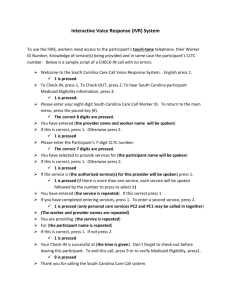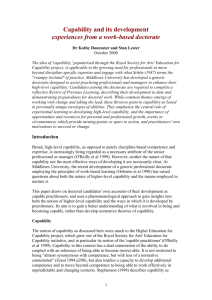implement goal directed care planning
advertisement
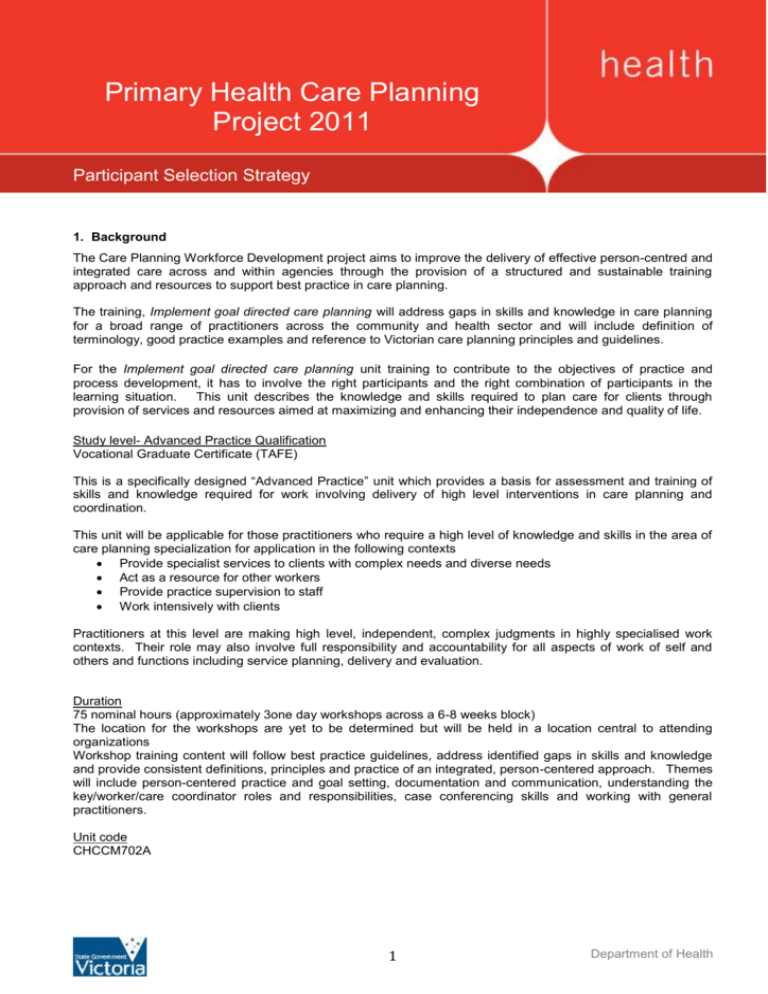
Primary Health Care Planning Project 2011 Participant Selection Strategy 1. Background The Care Planning Workforce Development project aims to improve the delivery of effective person-centred and integrated care across and within agencies through the provision of a structured and sustainable training approach and resources to support best practice in care planning. The training, Implement goal directed care planning will address gaps in skills and knowledge in care planning for a broad range of practitioners across the community and health sector and will include definition of terminology, good practice examples and reference to Victorian care planning principles and guidelines. For the Implement goal directed care planning unit training to contribute to the objectives of practice and process development, it has to involve the right participants and the right combination of participants in the learning situation. This unit describes the knowledge and skills required to plan care for clients through provision of services and resources aimed at maximizing and enhancing their independence and quality of life. Study level- Advanced Practice Qualification Vocational Graduate Certificate (TAFE) This is a specifically designed “Advanced Practice” unit which provides a basis for assessment and training of skills and knowledge required for work involving delivery of high level interventions in care planning and coordination. This unit will be applicable for those practitioners who require a high level of knowledge and skills in the area of care planning specialization for application in the following contexts Provide specialist services to clients with complex needs and diverse needs Act as a resource for other workers Provide practice supervision to staff Work intensively with clients Practitioners at this level are making high level, independent, complex judgments in highly specialised work contexts. Their role may also involve full responsibility and accountability for all aspects of work of self and others and functions including service planning, delivery and evaluation. Duration 75 nominal hours (approximately 3one day workshops across a 6-8 weeks block) The location for the workshops are yet to be determined but will be held in a location central to attending organizations Workshop training content will follow best practice guidelines, address identified gaps in skills and knowledge and provide consistent definitions, principles and practice of an integrated, person-centered approach. Themes will include person-centered practice and goal setting, documentation and communication, understanding the key/worker/care coordinator roles and responsibilities, case conferencing skills and working with general practitioners. Unit code CHCCM702A 1 Department of Health Assessment of competency attained Participants will be required to demonstrate knowledge of the elements of care planning and demonstrate skills for putting this into practice. These requirements will be assessed through: Workbook entries that respond to scenarios and questionnaires Workshop case studies, activities and participation Evidence gathered from the workplace setting or through simulation of the workplace setting in the workshop. A statement of attainment will be presented to the participant on successful completion of the unit. Participants may undertake additional units to complete related health and/or community services certificates. 2. How to access the training Proposals for funding under this program will be accepted from Victorian health and community services agencies that are members of their Primary Care Partnership and are actively engaged in Service Coordination. 3. Eligible Participants Eligible participants are those that work in a range of community and health sector contexts where a high level of care planning skills and knowledge are required. Occupational title may include: Client assessment and case management Case manager Assessment officer Assessor Child protection worker Child safety officer Social worker Key worker/care coordinator 4. Entry Requirement This unit is suited to candidates who have significant experience working as a care planner/care coordinator in the community or health sector, involving the exercise of independent judgement and decision making skills. It is recommended that candidates have: An undergraduate degree or postgraduate qualification related to work in the health and/or community sector OR Significant previous work experience in a community and/or health organisation, in a role involving the self directed application of knowledge with substantial depth in care planning/care coordination. 5. Work application requirements For successful statement of attainment of the unit competencies, candidates must demonstrate application of high level skills and knowledge in care planning, including investigative research and analysis and application of findings in a community or health sector work context relevant to care planning. 6. Co-payment Organisations that wish to access subsidised training for multiple applicants will be required to make a financial contribution. 7. Mandatory Agency Requirements Agencies MUST demonstrate: Page 2 arrangements that are necessary to ensure that all participants enrolled in the unit are able to complete workshop and assessment requirements commitment to continuous service improvement commitment to service coordination as evidenced by agency or program submission of the Service Coordination Survey 2010 Department of Health commitment by participants to lead care planning development in their agency and contribute to PCP service coordination activities. 8. Multiple Applications An organization may submit applications for more than one participant. A separate application MUST be submitted for each participant. 9. Applications Each agency must submit an application for each applicant which addresses the agency and participant selection criteria. Applications that do not address all of the criteria are unlikely to score well during the assessment phase 10. Selection Criteria Applications must complete the Selection Criteria. The Selection Criteria table outlines the issues that will be taken into consideration when assessing an application against each individual assessment criteria. It is important that applications succinctly address each of these criteria and that evidence is provided to support any assertions. Late applications will not be considered. 10. Closing Date Applications will close at 5pm on Wednesday 7th September 2011 11. Assessment of Applications Applications under this program will undergo a formal assessment process. Applications for funding will be considered against the eligibility and application requirements, and assessed by a panel of senior Departmental staff. All applications will be ranked according to the ability to demonstrate the required criteria and weighted using the priority areas identified. Following assessment and ranking, recommendations on successful applications will be submitted to the Primary Health Care Planning Project Board for approval. 12. Notification of Results All agencies/applicants will be notified in writing as to the outcome of their application for a funded training position, following the completion of the assessment process. Workshop timetables and outlines, objectives for the workshops and desired learning outcomes will be provided to successful applicants prior to the training. A copy of the unit – Implement goal directed care planning will be provided to participants prior to training commencement. Page 3 Department of Health





